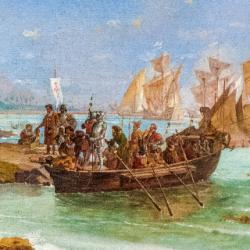I’ve always been flattered by the amount of positive comments from foreign strangers when I mention that I’m Canadian. I feel fortunate to live in a country where we seem to have a humorous reputation of being overly polite and excessively apologetic. But behind the seemingly friendly reputation, Canada isn’t exactly as free, polite and peaceful as it famously pretends to be. And like every other first-world nation on this earth, it doesn’t come without an underlying darkness. While Canada seems to have maintained a diverse, multicultural society, it seems as though the overall treatment of our Indigenous population falls abysmally short.
I’m not as well-researched in this topic, but this is another elephant in the room that makes it very difficult for me to remain a faithful Catholic next to the clerical sexual abuse scandals. I also write this article with the realization that my life has benefitted from a systemic privilege that isn’t as accessible to others. Regardless of the words I can muster, it will not erase the pain or the memories of what had happened. But my hope is that this article will help aid in opening a fruitful discussion, to raise awareness and to help those whose families have been affected find healing and reconciliation.
While the majority of Canada’s population enjoys a significant amount of comfort in quality of life, education, healthcare, employment and career opportunities, our Indigenous population has not experienced the same privileges. Many government-instituted reserves, while well-meaning in an attempt to maintain Indigenous recognition, have become quite isolated from the rest of society. This is largely due to a chain of events that have driven First Nation communities from the rest of Canadian society further apart.
There is a sad chapter in Canada’s history when the Catholic Church, along with some mainline Protestant churches, partook in the federal government’s attempt to ‘civilize’ First Nations people. This often included forcibly removing Indigenous children from their families and placing them in residential schools. The overwhelmingly numerous accounts of physical, emotional and sexual abuse have been gradually publicized, revealed the startling revelation that much of Canadian society has blood on their hands. The last of these residential schools had been closed down not even a few decades ago, but the government and churches are still dealing with the aftermath. Among those tragedies was the forced loss of culture — to be forbidden to be who you are; to not be allowed to wear traditional dress, sing traditional songs, dance traditional dances or to speak your native tongue. It is a cultural erasure that is unthinkable for many of us who are comfortable as North American citizens.
With the abuses perpetuated by clergy and other members of the Church, how does one respond to the continual claims that religion is the biggest cause of all the corruption in the world? These are the very people who are supposed to embody the love of Christ to everyone. And yet, despite Church teaching about loving our neighbours and avoiding sexual immorality, many of the crimes committed against Indigenous women were forced sterilization and abortion. These crimes were perpetrated by people who used their piety and authoritative power to assert dominance and control over those they deemed unholy or demonic.
In recent years, the Black Lives Matter movement in the U.S. has garnered a lot of attention regarding the treatment of African Americans by law enforcement. While there is much partisanship in opinion regarding Black Live Matter, it raises a lot of questions about the stereotyping of black individuals and their well-being. Similarly, Canada has a problem of the stereotyping of Indigenous persons by law enforcement and society in general. I hear about it in the news all the time, usually involving confrontations between the RCMP and someone of native descent — even something as simple as being pulled over for ‘looking’ native. The parallels of racism between both Canada and the United States is far too obvious to be left unaddressed.
This leads me to ask, what has changed? The Catholic Church has since apologized on behalf of the individuals responsible for exasperating the residential schools crisis. From what I’ve noticed, the schools in my country recite every morning that they stand upon Treaty Six land. Some of my friends have expressed their concern about why this acknowledgment is seemingly replacing the Canadian national anthem. I could imagine reciting the national anthem for some Indigenous individuals would be akin to the ancient Jews pledging their allegiance to Caesar after the Romans ransacked Jerusalem. From my understanding, acknowledgement of our past (whether positive or negative) is always a step in the right direction.
One of the uniting factors between the Catholic Church and Indigenous peoples are the saints. Saint Kateri Tekakwitha is the first Canadian Indigenous who was canonized as a Catholic saint. Many First Nations people go on pilgrimages to the resting sites of these saints in order to connect with their past and find healing. If there is common ground between Catholics and First Nations people, it can be found among the Indigenous saints who have experienced the joy and love of Christ firsthand.
The unfortunate reality is many activists believe they are fighting against a cruel, tyrannical Christian religion whose ultimate goal is colonialism and cultural genocide. The many horrific experiences from the residential schools are their lasting impression of what Christianity is to them. This is what makes the conversation so uncomfortable. Christians are hesitant to view themselves as being potentially culpable for an atrocity that is already engrained in the fabric of Western society.
I think one of the hardest lessons to learn as a Christian is the art of humility. It is the realization that we as Christians often forget we are just as capable of wrongdoing as every other human being on this earth. Our faith does not make us any less culpable for our actions, nor should it ever become a ‘free pass’ when it comes to opening ourselves up to evil. The fact people within the Church have committed such atrocities is a stark contradiction to the very message Jesus preached in the Gospels.
The best we can do is to look at the situation straight in its ugly face and admit the Church has, in many ways, cooperated with evil. Pride under the guise of piety will always cause religious persons to commit atrocities in God’s name. In spite of it being an advocate of truth and love, we as Christians need to stop pretending the Church is free from sin. We need more than just thoughts and prayers to mend the broken relationship between us and our Indigenous brothers and sisters. Our willingness to pursue reconciliation needs to be prayerfully evident in how we listen to and treat them, and how we acknowledge the past in spite of how uncomfortable it may be.
We shall lift their spirits, hear their experiences, try harder and never forget — and we ought to be damned if we ever allow such a travesty to happen again. This is our penance.
“The said Indians and all other people who may later be discovered by Christians, are by no means to be deprived of their liberty or the possession of their property, even though they be outside the faith of Jesus Christ; and that they may and should, freely and legitimately, enjoy their liberty and the possession of their property; nor should they be in any way enslaved.” —Pope Paul III, “Sublimus Dei”












